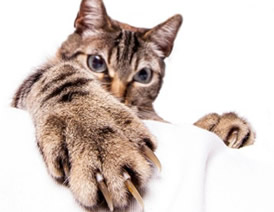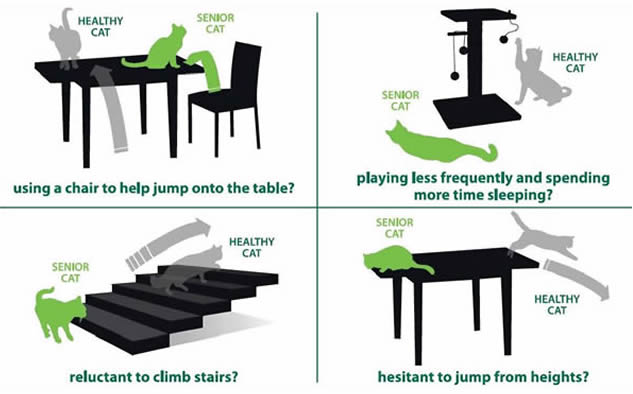
Our feline friends are known to be quite active and agile but as they age it is inevitable that they will start to slow down. Many cats can remain very healthy and vibrant during their senior years, but there are times when chronic disease and arthritis can affect their quality of life.
Arthritis is a chronic, painful, degenerative condition that can develop gradually over time, affecting one or more joints (typically the hips, knees and elbows). Its causes inflammation and pain of the joints. Arthritis can affect any pet at any age, negatively impacting a pet’s quality of life and preventing them from enjoying simple, daily activities such as walking, running or playing.
Most cats are classified as a senior feline once they are over seven years of age and this is when they can develop age-related conditions such as arthritis. It’s not always easy to recognise if your cat is in pain or suffering from arthritis. Many cats hide their discomfort so it can be hard to tell when they are uncomfortable. Cats do experience real pain with arthritis, comparable to the pain experienced by humans with this disease. The good news is that there many things we can do to help. The first step is to recognise when something isn’t quite right with your pet.
There are some changes in their behaviour that can help you identify if your cat is living with arthritis.
Important signs to look for in your cat’s behaviour:
- Reluctant to climb stairs
- Hesitant jumping down from heights
- Litter tray mishaps
- Increased aggression when stroked
- Poor self-grooming
- Disinterested in play time
- Difficulty jumping up onto surfaces (i.e. using a chair to jump up when they used to be able to jump straight up on the table)
- Spending more time sleeping
- Increased meowing
- Reduced interaction with you
Identify if your feline friend is living with arthritis:

If your cat has arthritis there are many new medications, special diets and supplements that will ease inflammation and pain to help your cat live a long and comfortable life. There are also things you can do at home to make your feline friend more comfortable. Provide soft, padded bedding, a step to jump on before jumping onto the bed, ensure they are warm and have a comfortable place to sleep. Discourage your cat from jumping and take care if they have access to outdoors as they may hurt themselves. Instead, encourage regular gentle exercise indoors using their favourite toy or scratching post. This will help maintain muscle-tone in their back and legs and help your cat to maintain a healthy weight.
It is not only arthritis that our senior cats can suffer from but as they get older they are prone to poor kidney function, obesity, cancer and other conditions.
Book your feline friend in for a Senior Wellness Check with your local Greencross Vet for a comprehensive review of your cat’s health. Your vet will look for early signs of stiff joints and other age-related health issues plus tailor a wellness program to help your feline friend age gracefully.

 Greencross Vets
Greencross Vets 










